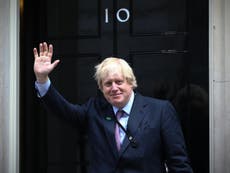Extinction Rebellion did all it could have hoped and more – but our crushing inertia remains its biggest obstacle
It is fair to conclude that the wave of direct action in the capital, turbo-charged by the arrival of Greta Thunberg, will bring about no immediate change in policy

Did Extinction Rebellion do much more than annoy London taxi drivers and right-wing climate change denying columnists?
It is fair to conclude that the wave of direct action in the capital, its moral force turbo-charged by the arrival of the 16 year old campaigner Greta Thunberg, will bring about no immediate change in policy. There will be no emergency legislation to further restrict carbon dioxide emissions. A timely series of warnings in TV programmes presented by that other secular saint, Sir David Attenborough has added another unimpeachable voice to the cause.
Even so, the price of petrol will remain where it is. The long-haul flights will still depart from Heathrow. The environment secretary, Michael Gove has said that the government “hears” the cry for change. That is, for the time being, as good as it gets.
More to the point, China will still be building new power stations, and the US will remain outside the structures of the Paris Accord on climate change. Deforestation, desertification, species extinctions and extreme weather events will continue to intensify.
And yet these protests have not been in vain. All the progress that has been made over the last fifty years on international action over climate change has been a product of popular movements, themselves spurred by the weight of scientific evidence and the leadership of – some – politicians.
From the first awakenings in the 1970s, the green movement has become ever more powerful. Like the suffragettes and the civil rights campaigns before them, and like those for the dismantling of colonial empires and LGBT+ rights, movements once ridiculed can bring change that is radical and permanent. Like those other successful incremental past movements the environmental cause has made itself increasingly mainstream.
Today, even after the efforts of Donald Trump and a global gang of client deniers, much of the world has mandatory targets on climate change and CO2 emissions – with Britain leading the way. The internal combustion engine will become a museum piece like the steam engine by mid-century. Where once virtually every machine, every train, every ship, and every power station in Britain was fuelled by coal, the UK has just enjoyed its longest period of zero coal derived electricity generation ever – 90 hours.
Now China is leading the world in electric propulsion and battery power. More and more cities want to charge for pollution and congestion. Citizens are clamouring for change, especially in the West.
Yet there is a great disconnect, a cognitive dissonance For once, the TV vox pops from the Extinction Rebellion were enlightening on this point: even many of those inconvenienced by the protests were sympathetic to the arguments. Few doubt what we are doing to the planet is suicidal. In a sense these protesters, unlike the average striker say, enjoys mass public support. But when the moment comes to book a week in Bali or buy a new car or go shopping for food swaddled in plastics we seem to forget our personal responsibilities. When we go to vote we rarely put the planet where it logically ought to be – at the top of our agenda.
Unlike Brexit, for example, or terror, the dangers of climate change seem entirely remote in time and geography – rainforests and Pacific islands completely disappearing over a period of decades rather than months, but nothing tangible nearer home. The science can sound simultaneously forbidding and trivial – a one degree rise in sea temperatures will have devastating consequences, but it is superficially inconsequential.
Gradually, perhaps, that is changing. There is more public understanding of the science. There is more acceptance of charges for congestion, for taxes on waste and pollution and support for investing in renewable energy. That is a very different climate of opinion from a few years ago.
Over Easter we have witnessed some bizarre dancing in the street, a pink boat marooned on Oxford Street, people glued to trains and Jeremy Corbyn’s garden fence, and outbreaks of the curious “jazz hands” phenomenon. We are talking about all that – and about climate change. Eccentric as much of it was, the protesters have drawn a little more attention to the immediacy of the threats the world faces. Getting out there was worth it.






Join our commenting forum
Join thought-provoking conversations, follow other Independent readers and see their replies